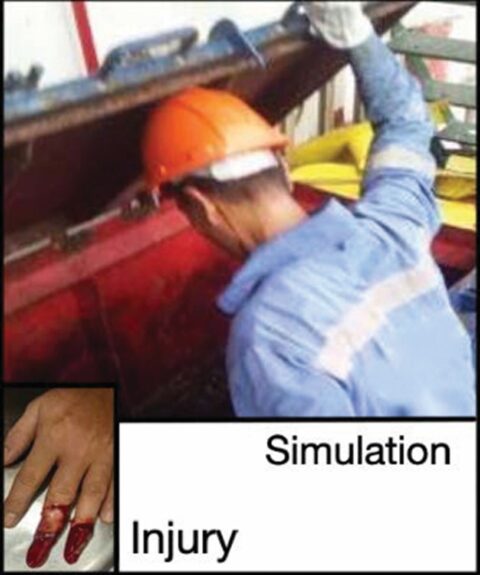Shortcuts and complacency can easily work their way into common everyday tasks. A recent Mars Report by The Nautical Institute gives an example of this behaviour, which resulted in a serious injury for a crew member.
The Nautical Institute gathers reports of maritime accidents and near-misses. It then publishes these so-called Mars Reports (anonymously) to prevent other accidents from happening. A summary of this incident:

A tanker was under way at sea in fair weather conditions. After breakfast, a crew member was undertaking a familiar task; disposing of food waste from the galley in the food waste container on deck. He lifted the heavy cover, but did not install the safety pin to ensure the door remained safely open during the disposal operation. Instead, he relied on this own strength to keep the door ajar.
The door slipped and fell on his left hand, causing severe injuries to his ring and middle fingers. After first aid on board, he was evacuated ashore and eventually sent home to undergo medical follow-up procedures.
Also read: Neglecting LOTO procedures results in crew member injury
Investigation findings
The company investigation found that although the crew member was very familiar with the task, he had acted with overconfidence and in contravention of the established procedure as he had not used the safety pin on the container hatch.
Also read: Finger crushed in windlass results in re-engineered pin that reduces risk
Advice from The Nautical Institute
- Everyday jobs can appear less risky as we become desensitised to the hazards. Stay aware!
- A strong safety culture means adhering to procedures and good practices.
Mars Editor’s note: Shortcuts and complacency can easily work their way into common everyday tasks. It is likely that this was not the first time this crew member had not used the safety pin. If other crew members or senior officers had witnessed these sub-standard acts, but did not correct the behaviour, they too are contributing to a weakening of the safety culture.
Mars Reports
This accident was covered in the Mars Reports, originally published as Mars 202343, that are part of Report Number 371. A selection of the Mars Reports are also published in the SWZ|Maritime magazine. The Nautical Institute compiles these reports to help prevent maritime accidents. That is why they are also published (in full) on SWZ|Maritime’s website.
More reports are needed to keep the scheme interesting and informative. All reports are read only by the Mars coordinator and are treated in the strictest confidence. To submit a report, please use the Mars report form.
Also read: A gap – a slip – an injury on board an LNG tanker: ‘Don’t overreach, ask for help’








